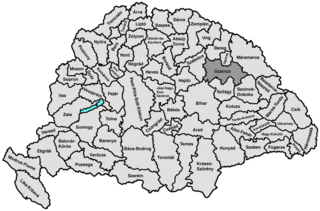
Andrew Báthory was the Cardinal-deacon of Sant'Adriano al Foro from 1584 to 1599, Prince-Bishop of Warmia from 1589 to 1599, and Prince of Transylvania in 1599. His father was a brother of Stephen Báthory, who ruled the Polish–Lithuanian Commonwealth from 1575. He was the childless Stephen Báthory's favorite nephew. He went to Poland at his uncle's invitation in 1578 and studied at the Jesuit college in Pułtusk. He became canon in the Chapter of the Roman Catholic Diocese of Warmia in 1581, and provost of the Monastery of Miechów in 1583.

Baron István Jósika de Branyicska or Ștefan Jósika was a Hungarian noble in the Principality of Transylvania, who served as Chancellor of Transylvania from Autumn 1594 to August 1598. He was the ancestor and first prominent member of the Baron Jósika de Branyicska family.
Demeter Naprágyi was a Hungarian prelate of the Roman Catholic Church, who served as bishop of several dioceses. He was the Archbishop of Kalocsa from 1608 to 1619. He also functioned as Chancellor of Transylvania between 1598 and 1600.
János Jacobinus was a Hungarian politician and historian of Saxon origin in the Principality of Transylvania, who served as Chancellor of Transylvania for a short time in 1603.
Mihály Káthay de Csekekáta was a Hungarian soldier and noble in the Principality of Transylvania, who served as Chancellor of Transylvania from December 1604 to September 1606. He was imprisoned and executed on charges of murder of Prince Stephen Bocskay, the leader of the Bocskay's War of Independence.
János Petki de Ders was a Hungarian noble and poet in the Principality of Transylvania, who served as Chancellor of Transylvania from March 1607 to 31 March 1608. He was the maternal grandfather of Prince Michael I Apafi.
István Kendi de Szarvaskend was a Hungarian noble in the Principality of Transylvania, who served as Chancellor of Transylvania from 31 March 1608 to 20 March 1610.

Sándor Kendi de Szarvaskend was a Hungarian noble in the Principality of Transylvania, member of the Royal Council, who served as Governor of Transylvania for the underage voivode Sigismund Báthory from 6 March 1583 to 1 May 1585.
János Ghyczy de Ghicz, Assakürt et Ablánczkürt was a Hungarian noble in the Principality of Transylvania, member of the Royal Council, who served as Governor of Transylvania for the underage voivode then prince Sigismund Báthory from 1 May 1585 to 17 December 1588.
János Imreffy de Szerdahely was a Hungarian soldier and noble in the Principality of Transylvania, who served as Chancellor of Transylvania from Spring 1610 to his death on 9 July 1611. He was a member of the Imreffy family of old origin.
István Kovacsóczy de Körtvélyfa was a Hungarian noble in the Principality of Transylvania, who served as Chancellor of Transylvania from 1622 to 1634. His father Farkas Kovacsóczy, also a Chancellor (1578–1594), was executed by Sigismund Báthory in 1594.
Farkas Bethlen de Bethlen was a Hungarian noble and chronicler in the Principality of Transylvania, who served as Chancellor of Transylvania from 1678 to 1679.
Márton Berzeviczy de Berzevicze et Kakaslomnicz was a Hungarian noble and diplomat in the Principality of Transylvania, who served as Chancellor of Transylvania for Stephen Báthory between January 1578 and 1586.
Pousa, son of Sólyom was a Hungarian nobleman, who served as voivode of Transylvania twice, in 1227 and 1235 to 1241.
Julius (I) from the kindred Rátót was a powerful Hungarian baron and landowner, who held several secular positions during the reign of kings Andrew II and Béla IV. He was the founder of the gens Rátót's economical and political power.
Stephen Báthory of Somlyó was a Hungarian nobleman, closely related to four princes of Transylvania.









